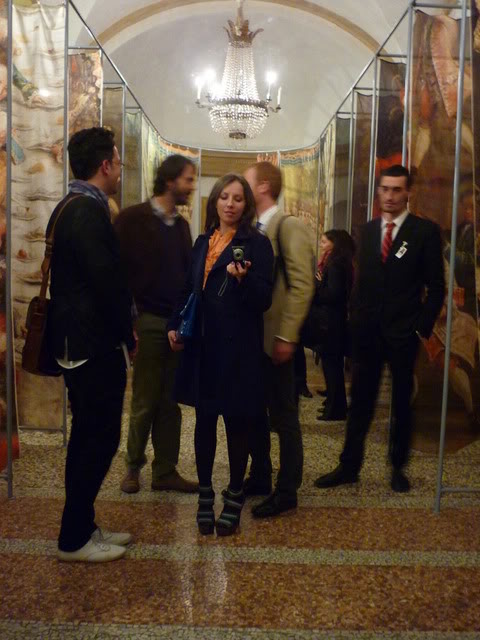 If nostalgia is a drug, I think I've recently taken an overdose.
If nostalgia is a drug, I think I've recently taken an overdose.Saturday evening I was transported for three hours to eighteenth-century Vienna, by way of the early nineteenth-century Italian composer, Vincenzo Bellini. In singing so heavenly the part of Romeo in Bellini's I Capuleti e i Montecchi, the magnificent Elina Garanca opened her mouth and I closed my eyes and pretended I was listening to Farinelli. You may be wondering why a mezzo-soprano would be singing the part of Romeo, obviously a male singing role. Since we no longer castrate young boys, we no longer have great castrati in the opera world. Certainly I'm not suggesting we reinstate such barbaric practices, but who wouldn't give their left lung to spend a night at the Opera House under the spell of the divine Farinelli.
This is what Farinelli actually looked like,

 but I much prefer this outlandish image from the 1994 film about his life, well - not really about his life, maybe about his sexed up and not very accurate life, but it's still a fun film.
but I much prefer this outlandish image from the 1994 film about his life, well - not really about his life, maybe about his sexed up and not very accurate life, but it's still a fun film.And the singing is heavenly, indeed, though it's particularly interesting to see how the film's producers got around the tone problem. They recorded the Polish soprano, Ewa Malas-Godlewska and the American countertenor, Derek Lee Ragin separately and then digitally merged the two voices to recreate the sound of a castrato. In a live staging, such digital manipulation is impossible which is why roles like Bellini's bel canto Romeo are typically handled by mezzo-sopranos.
And Elina did not disappoint as a stand in for our missing castrato: her tone was marvellous, in fact I've seldom heard a more toffee caramel tone from a mezzo and it blended sumptuously (can you tell I'm hungry? Caramel, toffee sumptuousness?) with Anna Netrebko's Giulietta, who provided an equally accomplished performance. Sadly, the supporting players were lacking slightly and the staging was at times embarrassingly contrived, but this is after all the story of Romeo and Juliet and the leads more than made up for any of the production's other failings.
Then today I went to the Geffrye Museum in Shoreditch - another one of those places you sometimes hear about, yet never get around to visiting. It's an absolutely marvellous place; very easy on the eye and, of course, provided another dose of nostalgia to perpetuate my weekend high. The museum is housed in a former home for elderly people and is comprised of "middle class" domestic interiors from 1600 to the present day. While I found the place delightful and fascinating, I also found it quite depressing to watch the gradual ebb of family activity and entertaining from the sitting room give way to the invasive, insular act of watching television. I also found the demise of the fireplace quite sad, and while central heating is obviously more effective (well, sometimes - only when it's working), from a purely ridiculous and aesthetic point of view, radiators are viciously ugly.
 All these beautiful sitting rooms, which used to emphasise company, conversation, activity, and entertaining became completely reorganised in the 50s and 60s when the TV set took over. I don't know if people are consciously aware of it, but in so many sitting rooms the television is the central axis around which everything else must be arranged. And here the nostalgia kicks in again. Why can't we go back to spending evenings reading, playing cards, talking, and drinking at home? (she says, as she tap tap taps on her laptop late into the night...) I suppose for many who live in places like London, it's because we don't really have the space. But really, I think it's because TV has become an essential home, especially sitting room, activity. You don't need a lot of space to arrange a convivial sitting room. Get rid of the TV (ha!) and see how easy it is. And if you don't believe me, make a trip to the Geffrye Museum where you too can become a convert to the cult of nostalgia.
All these beautiful sitting rooms, which used to emphasise company, conversation, activity, and entertaining became completely reorganised in the 50s and 60s when the TV set took over. I don't know if people are consciously aware of it, but in so many sitting rooms the television is the central axis around which everything else must be arranged. And here the nostalgia kicks in again. Why can't we go back to spending evenings reading, playing cards, talking, and drinking at home? (she says, as she tap tap taps on her laptop late into the night...) I suppose for many who live in places like London, it's because we don't really have the space. But really, I think it's because TV has become an essential home, especially sitting room, activity. You don't need a lot of space to arrange a convivial sitting room. Get rid of the TV (ha!) and see how easy it is. And if you don't believe me, make a trip to the Geffrye Museum where you too can become a convert to the cult of nostalgia.




No comments:
Post a Comment